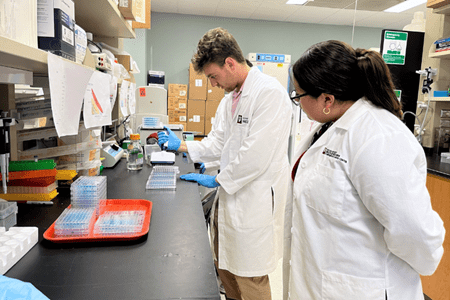In the summer of 2025, more than 20 undergraduate students joined the Indiana University School of Medicine for a hands-on journey into the world of science and medicine. From early June to late July, they participated in one of three immersive internship programs hosted by faculty and staff at the Herman B Wells Center for Pediatric Research: the Wells Center Summer Internship Program; the Medical Physician Engineers, Scientists and Clinicians Preparatory (MPESC-Prep) Program and the Cooperative Center of Excellence in Hematology (CCEH) Enrichment Program.
Each program offers a unique experience, but they all share a common goal of preparing the next generation of biomedical scientists and physicians. For eight busy weeks, interns worked alongside IU experts, gained real-world lab experience, attended research seminars and explored potential careers in medicine.
The students also participated in interactive workshops and connected with fellow interns from across the country. Most importantly, the interns built lasting relationships with their mentors and lab teams. Several demonstrated the power of these relationships by returning for a second or even third summer, which allowed them to take on more advanced roles and deepen their skills.
Keep reading to learn more from several interns who reflected on their experiences and how these internships are shaping their future paths.
Meet the interns: Summer 2025
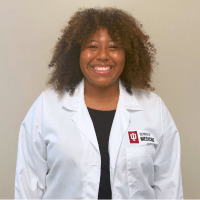 Name: Aysha Bennett
Name: Aysha Bennett
Current Institution: Indiana University Bloomington
Research Mentor: Jim Ropa, PhD
Research Interests: Hematopoiesis; hematopoietic stem cells; umbilical cord blood transplantation and potency; PRSS2
Internship Program: CCEH
What inspired you to pursue a research-focused internship at the IU School of Medicine this year?
My interest in pursuing a career as a physician-scientist inspired me to pursue a research-focused internship at the IU School of Medicine. I wanted to learn how research influences medicine and vice versa, and how they work hand in hand. Further, I wanted to gain a sense of how IU School of Medicine's biomedical laboratories conduct, analyze, and collaborate on research, and how I can start implementing those philosophies in other research endeavors.
Have you had any memorable conversations or moments with your lab mates or peers?
When working in the lab, I had multiple instances of contamination, low cell counts on thawed high-cell-count vials, and other mistakes. I always caught myself being overly critical of myself and not accepting my mistakes or results. Every time, Jim always reassured me that it is okay and not to be overly critical of myself, but instead jump back in and own everything that happened. He made me realize that I need to relax and just accept what happens, instead of freaking out. I will carry that on in science and in life, and I will continue to work on that.
How does this internship align with your academic or career goals?
This internship gave me insight on what being a scientist is all about and the various components that go into academic laboratories. This experience helped me further solidify my decision to pursue an MD-PhD to become an academic physician-scientist.
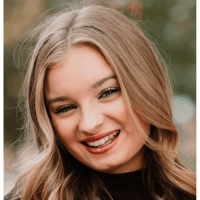 Name: Lily Brace
Name: Lily Brace
Current Institution: Hanover College
Research Mentor: Ka-Kui Chan, PhD
Research Interests: Evaluation of Kinase Inhibitors to Restore NF1 Haploinsufficiency
Internship Program: MPESC-Prep
What inspired you to pursue a research-focused internship at the IU School of Medicine this year?
I've always been very interested in the medical field and driven by a desire to help others, which naturally led me to explore the impact of research in advancing medicine. Pursuing this internship at the IU School of Medicine allows me to contribute meaningfully to the medical field while also gaining valuable insight into the world of medicine through hands-on learning and discovery.
If you could give advice to a future intern, what would you say?
Don't ever be afraid to ask questions and say yes to every opportunity. Everyone here at IU wants to help you learn and grow as a scientist. This is an amazing opportunity to be surrounded by people who have spent years learning what it means to be a scientist and are eager to help you learn as well. Step out of your comfort zone and take advantage of every opportunity you are given.
How does this internship align with your academic or career goals?
I want to pursue an MD and eventually treat pediatric patients. IU and Riley Hospital for Children gave me the opportunity to experience patient interaction, speak with doctors and scientists, and learn what it is like in a medical environment. I formed connections and relationships with peers, scientists and doctors that I believe will support me and help me accomplish my goals.
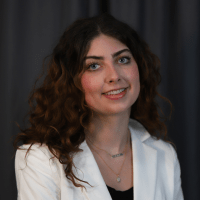 Name: Corinne Dilger
Name: Corinne Dilger
Current Institution: Hanover College
Research Mentor: Benjamin Gaston, MD
Research Interests: Human airway epithelial cell biology, cilia characterization
Internship Program: MPESC-Prep (third year)
How has your perspective on research or your field evolved since your first year in this internship program?
I initially got into research because I wanted to advance medicine, but over time fell in love with the science itself. While patient translation is still my motivator, I began to appreciate each step along the way more. Now, seeing cilia on High-Speed Video Microscopy is equal parts exciting as a diagnostic tool and just wonder for cilia itself!
How do you see the research you've done throughout your internship experiences contributing to advancements in medical science or improving patient care in the long term?
My work has focused on primary human airway epithelial cell biology, which directly translates to patient care. In producing organotypic cultures, what we study in the lab is physiologically representative of the human airway. This has extensive implications for medical science advancement through the ability to make diagnoses and hopefully develop new treatments. Shadowing my mentors and hearing the hope they give patients because of the work we do in lab is so inspiring and drives me to continue this work.
How does this internship align with your academic or career goals?
I hope to become a pediatric pulmonologist involved in translational research, so it has been amazing to experience my field of interest while still in undergrad. Shadowing at Riley and working at the Wells Center have exponentially increased my passion for the field, especially in how pediatric pulmonology thrives through multidisciplinary efforts.
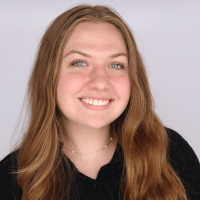 Name: Stefania Farha
Name: Stefania Farha
Current Institution: Butler University
Research Mentor: Benjamin Gaston, MD
Research Interests: Targeting RSV inhibition through a specific chemical compound
Internship Program: Wells Center Summer Internship
What inspired you to pursue a research-focused internship at the IU School of Medicine this year?
I have long respected the research advancements produced by such a local institution. As my academic interests in biomedical research and medicine developed, I aspired to contribute to and grow within such an environment. This experience has provided meaningful opportunities for professional and intellectual development and has exceeded my expectations. I would strongly recommend it to those pursuing similar academic and research interests.
What’s one skill or concept you’ve learned that you didn’t expect to use this summer?
Working in a translational research lab for the first time, I gained far more hands-on experience than I anticipated, particularly with primary human cell lines. Whether infecting these cells or observing ciliary motion under a high-speed microscope, I was exposed to an area of biomedical science previously unfamiliar to me. This experience significantly broadened my understanding of cellular and translational research.
Have you had any memorable conversations or moments with your lab mates or peers?
I have truly enjoyed getting to know the people in my lab. One of them, Corinne, is part of another internship program here, and we talk every day. We are both currently navigating the same application processes, and having someone to share that experience with has been incredibly helpful. Beyond that, everyone in the lab has been welcoming and supportive. From the laughter shared during experiment downtime to the stories exchanged throughout the day, this experience will be memorable not only for the research but also for the valuable relationships I have built.
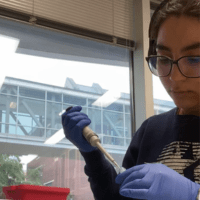 Name: Vianney Gonzalez-Gonzalez
Name: Vianney Gonzalez-Gonzalez
Current Institution: Indiana University Indianapolis
Research Mentor: Brian DeBosch, MD, PhD
Research Interests: The effects of modulating Slc30a10 on Per1 lko/WT mice
Internship Program: Wells Center Summer Internship
What inspired you to pursue a research-focused internship at the IU School of Medicine this year?
I was inspired to pursue a research-focused internship at the IU School of Medicine this year because it allowed me to continue working with an amazing team that has been teaching me about the amazing world of biochemical metabolic research this past year. Working with them full-time allowed me to learn many new techniques, refine previous skills and learn from various team members with diverse backgrounds in research.
If you could give advice to a future intern, what would you say?
My advice to a future intern would be to use your resources! Every person, paper, textbook, protocol, etc. that you can get your hands on provides you with a great learning opportunity. They all bring different angles and backgrounds to the big picture of research.
Have you had any memorable conversations or moments with your lab mates or peers?
One of the memorable moments I had this summer with my lab colleagues was learning to dissect and collect tissue samples. This was a large learning curve for me, as I felt very uncomfortable the first few times I practiced dissecting. All the members of my lab took turns teaching me their own techniques and even repeated steps to let me get a better look. By the end of the summer, I was able to confidently collect tissue samples on my own (albeit a lot slower than everyone else), all thanks to the time everyone took to teach me and make sure I felt confident in this very important skill.
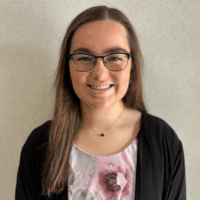 Name: Jennavee Houser
Name: Jennavee Houser
Current Institution: Hanover College
Research Mentor: Kirsten Kloepfer, MD
Research Interests: Pediatric asthma, preventative dentistry, oral microbiome impact on overall health
Internship Program: MPESC-Prep (second year)
How has your perspective on research or your field evolved since your first year in this internship program?
I've grown to appreciate the broad impact that clinical research has to offer directly to patient care. It's been fascinating to learn about the effects of different practice patterns to treat similar cases and I've started identifying how asthma can impact other facets of a patient's life. My experience in this internship program has encouraged me to look for connections from data to patient well-being.
How do you see the research you've done throughout your internship experiences contributing to advancements in medical science or improving patient care in the long term?
My research project is looking at practice patterns among various institutions to treat severe pediatric asthma. Hopefully, by looking at similarities and differences in observation and prescription patterns these centers can devise a standard of care to treat patients with asthma biologics.
If you could give advice to a future intern, what would you say?
Be willing to ask questions. Most of the time, we will be the least educated person in the room so it's okay to ask clarifying questions and not know all the answers. Research can be really fun if you go into the experience with an excited mindset ready to learn!
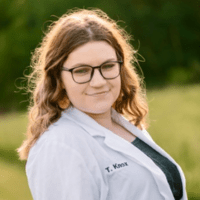 Name: Taylor Knox
Name: Taylor Knox
Current Institution: Hanover College
Research Mentor: David Hains, MD
Research Interests: Nephrology, Genetics
Internship Program: MPESC-Prep (third year)
How do you see the research you've done throughout your internship experiences contributing to advancements in medical science or improving patient care in the long term?
The research I’ve contributed to during my internship has the potential to play a meaningful role in both understanding disease mechanisms and informing clinical approaches. By studying the genetic factors involved in vesicoureteral reflux, we’re helping to uncover why certain children are more prone to this condition and its complications, such as recurrent kidney infections and scarring. This could eventually lead to earlier diagnosis, better risk stratification and more personalized treatments. More recently, our work with vitamin D has opened up important questions about how it influences kidney development and immune function. In the long term, I hope this research contributes to more targeted preventative strategies and therapies, ultimately improving outcomes for pediatric patients with kidney-related disorders.
What’s one skill or concept you’ve learned that you didn’t expect to use this summer?
Prior to this summer, I hadn’t anticipated how much I’d rely on the knowledge I’ve gained from my coursework. Since I’m close to graduating, I found myself pulling from different areas of my degree — especially when I hit roadblocks. I learned how to troubleshoot more independently, applying what I already knew to figure out what I didn’t, which really helped me grow more confident as a researcher.
Have you had any memorable conversations or moments with your lab mates or peers?
One of the most memorable aspects of this internship has been the conversations I’ve had with my mentor and lab mates about the value of both positive and negative results. There were times when experiments didn’t go as planned, and I initially felt discouraged. But those discussions helped shift my perspective. They reminded me that negative results are still meaningful and often lead to important questions or new directions.
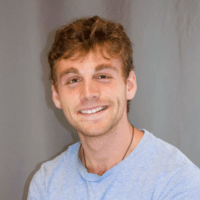 Name: Gabe Mervis
Name: Gabe Mervis
Current Institution: Davidson College
Research Mentor: Karen Pollok, PhD
Research Interests: Pediatric Oncology; Precision Genomics and Combination Therapies for Pediatric Sarcoma
Internship Program: Wells Center Summer Internship (second year)
How has your perspective on research or your field evolved since your first year in this internship program?
My perspective has evolved significantly since my first year in the program. Returning to the lab this year, I feel much more confident and comfortable not only with the protocols and equipment, but also with the science behind the work we’re doing. Last summer, everything was new, and I learned a lot by observing and assisting. This year, having more familiarity has given me a greater sense of autonomy and purpose. It's incredibly rewarding to come into the lab each day knowing what I'm doing and why. I no longer feel like I constantly need someone guiding me; instead, I feel like I can take initiative and contribute in a meaningful way.
If you could give advice to a future intern, what would you say?
Don’t be afraid to admit when you don’t know something. You’ll be introduced to a lot of information, and much of it will be things you haven’t encountered before. No one expects you to understand everything right away. The best thing you can do is ask questions and come into the lab each day excited to learn. The more time and effort you put in, the more everything will start to make sense and the more confident you’ll become in your abilities. Everyone starts somewhere, and growth comes from being open to new ideas.
Have you discovered anything new about yourself through this internship?
I’ve learned that I’m much more capable than I originally believed. Going into my first long-term lab experience, I had a lot of doubts about whether I’d be able to contribute in a productive way. But over time, I have exceeded my own expectations. A big part of that growth is thanks to the incredible guidance and leadership provided by this program and everyone in the Pollok lab. This experience has shown me that I can thrive in a research environment and make a real impact.
 Name: Princess Murray
Name: Princess Murray
Current Institution: Indiana University Indianapolis
Research Mentor: Matthew Durbin, MD
Research Interests: Congenital Heart Defects
Internship Program: MPESC-Prep (third year)
How has your perspective on research or your field evolved since your first year in this internship program?
When I first started this internship after my freshman year, I didn’t fully understand the impact research could have on real people’s lives. I thought it was mostly lab work and data. But over the years, my perspective has changed completely. I've learned that research is at the heart of innovation in medicine and patient care. It’s not just about numbers; it’s about asking the right questions and pushing boundaries that can lead to better diagnoses, treatments, and health outcomes. Coming from Gary, Indiana, where access to quality healthcare can be limited, I now see how research can bridge gaps in care and make healthcare more equitable. This experience has given me a sense of purpose and a strong desire to contribute to that change.
How do you see the research you've done throughout your internship experiences contributing to advancements in medical science or improving patient care in the long term?
The research I’ve been a part of has helped me see how even small discoveries or pieces of data can lead to big changes over time. Whether it’s identifying patterns in patient responses, contributing to a larger project, or learning new lab techniques, each step plays a role in improving patient outcomes. As a Black woman from an underserved community, I also understand how important it is to have diverse perspectives in research. My work and voice in this space help ensure that the questions we ask and the solutions we develop are inclusive and can serve all communities, not just the ones traditionally represented in science. I truly believe the work I've done will contribute to more personalized, equitable, and effective healthcare down the road.
What’s one skill or concept you’ve learned that you didn’t expect to use this summer?
One skill I didn’t expect to use but ended up relying on a lot was science communication. Whether it was presenting my research, discussing results with my mentor, or even just talking with peers from different disciplines, I realized how important it is to explain complex ideas clearly. Being able to break things down so anyone can understand not only helped me connect with others, but also helped me better understand the science I was doing. As someone who wants to bridge gaps in healthcare, especially in underrepresented communities, this is a skill I know I’ll carry with me for life.
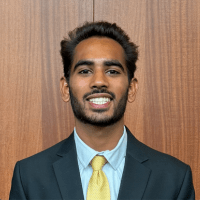 Name: Anandkumar Patel
Name: Anandkumar Patel
Current Institution: University of Southern Indiana
Research Mentors: Reuben Kapur, PhD, and Santhosh Pasupuleti, PhD
Research Interests: Hematology Oncology; Juvenile Myelomonocytic Leukemia
Internship Program: Wells Center Summer Internship
If you could give advice to a future intern, what would you say?
Try to ask as many questions as possible. Everyone is here to help you learn, and the best way to learn is right from the experts.
How does this internship align with your academic or career goals?
This internship has taught me how to read academic papers and many lab techniques. These new skills will certainly serve me in the future as I try to conduct more research during medical school.
Have you discovered anything new about yourself through this internship?
I have begun to enjoy reading academic papers. At the start, it was very difficult to read these articles, but I have gotten much better at it. My boost in knowledge has made it much easier to read academic papers, and I have even started to enjoy reading them.
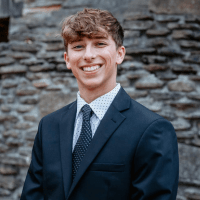 Name: Angus Stergar
Name: Angus Stergar
Current Institution: Indiana University Bloomington
Research Mentor: Danielle Soranno, MD
Research Interests: Pediatric Nephrology
Internship Program: MPESC-Prep (second year)
How has your perspective on research or your field evolved since your first year in this internship program?
After having exposure last summer, my focus this summer transitioned to being as independent as possible. I wanted to utilize my knowledge from last summer and challenge myself in new situations. Doing this has challenged my mind more and forced me to think critically in new situations.
How do you see the research you've done throughout your internship experiences contributing to advancements in medical science or improving patient care in the long term?
Research is notoriously time intensive and many times requires several years investment in one project to see its contributions in medicine. Despite this, I feel confident that the work I have contributed will continue to develop and eventually make its way to impacting patients at the bedside.
How does this internship align with your academic or career goals?
This internship was a vital resource in allowing me to gather a list of options for once I graduate college. There are an infinite number of possibilities, but working in the lab daily and listening to the weekly seminars allowed me to decide what would best fit me and my goals.
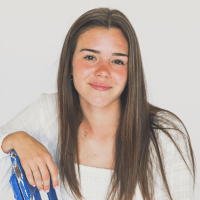 Name: Gracie Whitacre
Name: Gracie Whitacre
Current Institution: Indiana University Bloomington
Research Mentor: Maegan Capitano, PhD
Research Interests: Improving Cord Blood as a Hematopoietic Cell Transplant Source
Internship Program: CCEH (third year)
How has your perspective on research or your field evolved since your first year in this internship program?
My goal is to attend medical school, and during my first year in this internship program I was primarily interested in learning about the human body and diseases. My perspective on medicine has changed since then because research has taught me to think on a deeper level and consider the mechanisms of disease in much more detail. Instead of just knowing what's happening in the body, I have learned to ask questions about why it's happening and how we can improve treatment methods, which is a mindset that will serve me as I pursue a career in medicine.
If you could give advice to a future intern, what would you say?
My advice to a future intern would be to ask questions. The mentors at the IU School of Medicine are all amazing and want to help you succeed. There are no dumb questions, especially this early on in your career. The more questions you ask, the more you'll learn.
Have you had any memorable conversations or moments with your lab mates or peers?
My lab mates and mentors have always emphasized the fact that all data is important, even if it's not the results you expected. I've learned not to give up when my experiments don't align with my hypothesis because failure often leads to new research avenues.
